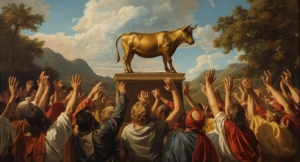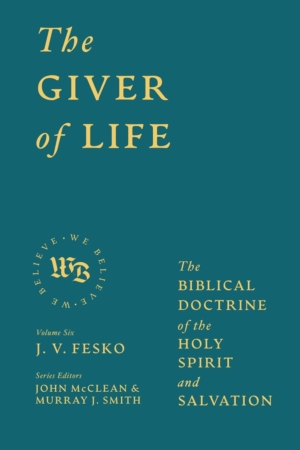On sale right now at WTS Books for $39.99. Continue reading →
Heidelminicast: The Israel Of God (5)
In this episode Dr. Clark continues his series “The Israel of God”. Continue reading →
The Hall of God’s Faithfulness, Part 5: Faith, Reproach, And Redemption (Hebrews 11:23–31)
Some people are just larger than life. We have all met them. Whether or not they are celebrities in the world’s eyes, some individuals walk into the room and take over the attention and the conversation. That is Moses in the Old . . . Continue reading →
Rufo: Fuentes Is An Attention-Seeking Fraud
The racialist influencer Nick Fuentes has caused an uproar with his appearance on Tucker Carlson’s podcast. Fuentes, a 27-year-old live-streamer, has built a reputation as the most controversial voice on the right. He’s embraced seemingly every taboo: praising Hitler, disputing the Holocaust’s . . . Continue reading →
Ecclesial Shenanigans = Antisocial Behavior
With simple visuals and authentic Appalachian-American verbiage, the Little Bubby Child social media accounts1 paint a loving and humorous picture of modern-day hillbillies as they interact with broader American culture. It’s not all fun and games—the dysfunction and breakdown are on display, but the wisdom . . . Continue reading →
Justification By Faith And Social Justice By Works (Part 2)
The gospel can be turned into law—even into new religious laws, especially when sweeter fruit is available to stave off the bitter taste of judicial conviction. When fallen creatures turn down contracts with part or all of the moral law, the door invariably opens to various forms of religious innovation, new orders for spiritual justice. Continue reading →
Heidelminicast: The Israel Of God (4)
In this episode Dr. Clark continues his series “The Israel of God”. Continue reading →
Top Five Posts For The Week Of November 17–23, 2025
These were the top five posts for the week of November 17–23. Continue reading →
The Quest For Illegitimate Religious Gnosis: How “Fringe” Theology Deforms Christology
Recently a theological controversy that had been simmering in podcasts and blog articles for many months finally reached a painful, public climax. In the first week of November, ministries that had been respected pillars of the online Particular Baptist world fractured. Justin . . . Continue reading →
Revelation 3:20 May Not Mean What You Were Told It Does
“Behold, I stand at the door and knock. If anyone hears my voice and opens the door, I will come in to him and eat with him, and he with me.” Revelation 3:20 There’s a saying that “a text without context is . . . Continue reading →
Heidelcast For November 23, 2025: Have This Mind: Philippians (6)
In this episode Dr Clark continues the series, “Have This Mind” Continue reading →
Heidelcast: Superfriends Saturday: Demonic Possession
In this episode of the Heidelcast, Dr. R. Scott Clark talks about demonic possession. Continue reading →
The Weber Thesis Versus What Really Happened
At least four large sources of income fueled Geneva’s new economic engine during this period. First, revenue for Geneva increased dramatically from 1550 to 1570 primarily due to the large number of new citizens (refugees). In two years (1555-1556), Calvinist refugees who were flocking . . . Continue reading →
From Glory To Glory: The Story Of Christ In Psalms 15–24 (Part 9): Psalm 18 And Remembering God’s Works
What David says in Psalm 18:20–30 is a little bit startling, and his statements should probably give us pause before we are willing to say them in reference to ourselves. Continue reading →
The Splendor Of The Three-In-One God: The Necessity And Mystery Of The Trinity (Part One)
“Hear, O Israel, the Lord our God, the Lord is one!” (Deut 6:4) In contrast to the polytheistic religions of her neighbors, Israel was made deeply conscious of the fact that there is only one God (hence, the term, monotheism). The monotheistic . . . Continue reading →
The Backstory To The Canons of Dork
The backstory of our Canons of Dork comics. Continue reading →
A Word Or A Weight?
There are seasons when sin is only a word, and others when it is a weight. Not the light sting of conscience either, but the slow crush of truth. David knew it, the feeling that one’s own soul has become its own . . . Continue reading →
Video: Is Mary Co-Mediator With Jesus?
In the statement, Mater Populi Fidelis, the Roman Catholic Church clarifies and modifies some of its language about Mary. As a Protestant, Pastor Adriel Sanchez shares what he appreciates, and where he still pushes back, on Marian Catholic teaching. RESOURCES Subscribe To . . . Continue reading →
Hook: I Judged Socialism By Its Intent
I cannot absolve myself from the guilt of failure to exercise critical responsibility toward my own radical ideals. I was guilty of judging capitalism by its operations and socialism by its hopes and aspirations; capitalism by its works and socialism by its . . . Continue reading →
Heidelminicast: The Israel Of God (3)
In this episode Dr. Clark continues his series “The Israel of God”. Continue reading →
Review: The Giver Of Life: The Biblical Doctrine Of The Holy Spirit And Salvation By J. V. Fesko
It is a familiar experience: A non-Reformed believer finds out you are of a Calvinistic persuasion, and before long there is an either explicit or implicit assertion that you do not have a prominent place for the Holy Spirit in your theology. . . . Continue reading →










